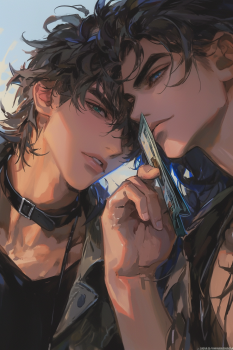Chapter 8
At the same time, Ethan Carter saw the two people in the meeting room through the glass door. He pushed the door open, “What are you two doing? I had to look all over to find you.”
Henry Foster calmly withdrew his hand, glancing down to see his wrist reddened from being gripped. Logan Brooks, on the other hand, hopped off the table with a relaxed expression. “Nothing much, just building some rapport in advance.”
“Oh, come on, it’s been two years and you still haven’t built any rapport. Stop pretending.” Ethan Carter paid attention to the look on Henry Foster’s face and deliberately asked, “What’s wrong?”
“I’ve taken care of that matter,” Logan Brooks answered first. “I’ll tell my sister about it later. If this Yang Chenggang keeps acting up, we’ll just pull the investment. With his character, once his behavior is exposed and the show gets boycotted, her money will be wasted anyway.”
Ethan Carter nodded. The reason he was willing to tell Logan Brooks was because he knew about his previous conflict with this assistant director, and he understood that with Logan Brooks’s zero-tolerance personality, he would definitely take action.
“So you really should thank little Brooks.” He put his arm around Henry Foster’s shoulders and led him back to their previous meeting room, but Henry Foster just stiffened and replied in a low voice.
Logan Brooks walked behind them, watching Henry Foster’s back. He knew well that people are bundles of contradictions. But Henry Foster was probably the strangest contradiction he’d ever seen. Outwardly, he had a natural coldness, as if he kept everyone at arm’s length no matter the situation, yet he was deeply entangled in those rumors.
But seeing him now, with that “better to break than bend” attitude, Logan Brooks was genuinely curious.
Could it be post-traumatic stress?
Logan Brooks looked down on people who climbed up by selling their bodies, but he had a natural appreciation for those with real talent. Henry Foster was one of those people—his dancing skills were top-tier in the entire industry, not to mention his naturally outstanding singing voice. After working together for two years, Logan Brooks’s initial peak of dislike, fueled by rumors, had gradually faded, and now he felt almost nothing.
Almost nothing, and a bit of curiosity, because Henry Foster’s contradictions were just too unique.
The second half of the meeting went by quickly. Logan Brooks was distracted and even forgot that he’d come here to oppose the plan to pair them up as a CP. After a while, the main doors of the meeting room opened, and the other four teammates came in one after another.
The boss signaled everyone to sit down and instructed the assistant to hand out the new project proposal. “Since debut, Kaleido has only released two albums, and the most recent was a mini-album a year ago. Honestly, you should have made a comeback by now—I’m sure you’re all anxious about it.”
David Brooks looked around. “We just discussed this in our meeting. To make the most of the recent buzz, the company has decided to move quickly on producing and releasing a new album.”
Captain Samuel Reed raised a question, “But making an album takes time…”
“That’s right,” said David Brooks. “We can’t just rush the production and put out a shoddy album to fool the fans just because there’s hype. You’re idols—singing and dancing is your calling, and at the very least, you can’t let people down in that regard. To balance production quality and time, we’ll need other ways to maintain the buzz. Brian and Samuel Reed, you both have variety show resources, Owen Clark is filming a dance show, Caleb Grant has an OST, and Henry Foster is recording…”
Ethan Carter interrupted, “Henry Foster’s show is gone.”
A hint of confusion appeared on David Brooks’s face, but he didn’t press the issue and continued, “We’ll talk about that later. In any case, we’re negotiating for more resources, and if things go well, we can get you a spot as guest stars on a popular variety show.” With that, he signaled his assistant to hand out another project proposal.
Caleb Grant quickly flipped through the proposal, exclaiming in surprise, “There’s a group variety show too?!”
“This time, we’ll mainly document your real lives, though we might add some entertainment segments to keep things from getting monotonous,” Ethan Carter explained the details of the group variety show to everyone. “The format might be filming and broadcasting at the same time, with some live streams in between to save time.”
Before the meeting ended, David Brooks stood up. “You’re all talented kids. After these two years, you should know how harsh this industry is. I don’t need to say more—you all know it in your hearts.”
“I look forward to seeing you shine as idols.”
When Henry Foster heard this, he felt as if he’d returned to the very beginning. The stage he once longed for seemed to be drawing near again, even if it was in such an absurd way.
On the day the meeting ended, the six of them stayed at the company to start practicing for the new album.
Today’s entertainment industry gives idols plenty of opportunities, but not many chances for the profession of “idol” itself. The awkward part is that most of these young people entered the industry with dreams of singing and dancing, but in the end, for various reasons, ended up doing all sorts of other jobs. Bearing the title of idol, they suffered all kinds of prejudice and never truly got the stage they deserved.
Gradually, they drifted away from music and dance, each one exhausted from running between film sets big and small, pulling countless all-nighters in similar studios, forgetting their original intentions, and in the end, receiving only a dismissive comment like “greedy and insatiable” or “don’t take on a job you can’t handle,” fading away in the new wave of rising stars.
